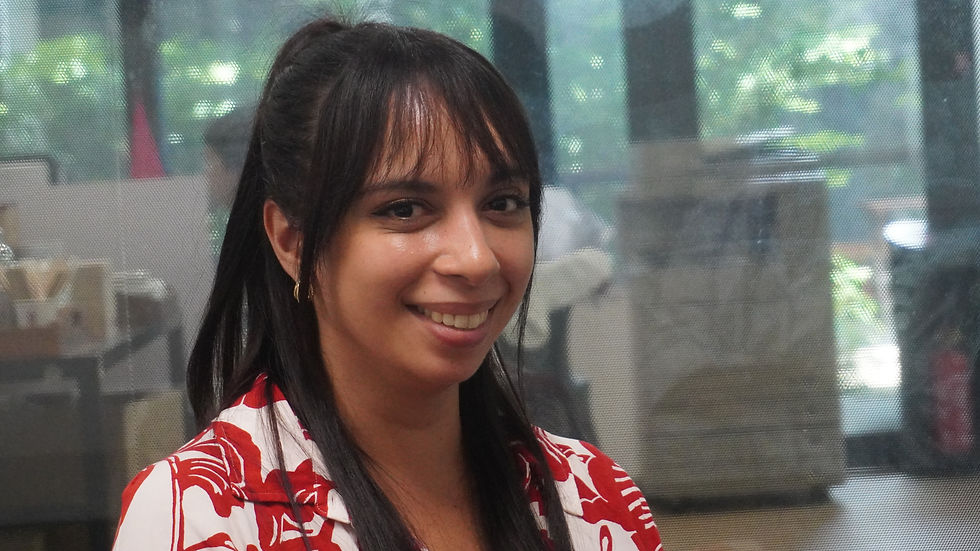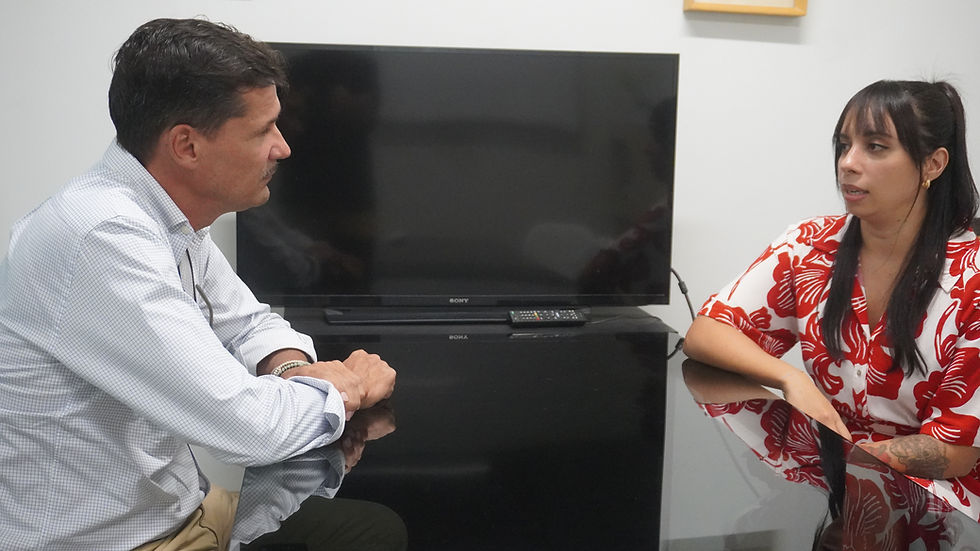Meeting with Ophélie Choisy: The inspiring career of a human resources specialist between Réunion, Paris and Cambodia
- Christophe Gargiulo

- Sep 5, 2025
- 5 min read
In this intimate interview, Ophélie Choisy (Convergences) looks back on her rich and unusual career path, from her roots in Réunion to her studies and early experiences in Paris, and finally her move to Cambodia. A human resources specialist, she shares her motivations, challenges and successes in a constantly evolving professional world, as well as her vision of the local market in Cambodia. An insightful and optimistic encounter on change, adaptation and cultural diversity.

Can you introduce yourself in a few words?
My name is Ophélie, Ophélie Choisy. I am 34 years old, and I was born and raised on Reunion Island. I left the island when I was 18, just after finishing secondary school, to pursue my higher education in Paris.
My initial idea was to study for five years and then return to Réunion. But, as time went by, I changed my plans several times: I started with a BTS (higher technical certificate), then went back to university, where I obtained two bachelor's degrees before specialising in human resources with a bachelor's and a master's degree.
I left school quite late, but I did a work-study programme, which allowed me to gain professional experience while I was still studying.
Why Reunion Island?
My mother is from Reunion Island and my father is from Paris. They met in Paris, where they both worked as civil servants at the Ministry of the Interior. When my mother told them about Reunion Island, they decided to move there together, and they have never returned to Paris since. For my father, leaving Reunion Island is simply unimaginable.
What was your first job?
My first job was with the IONIS private education group. I actually attended three schools in this group: the fashion school, the traditional business school, and then an engineering school.
In this position, I was responsible for the educational department, particularly with regard to students, but I was also responsible for the contractual HR side of things for teachers: drawing up contracts, managing leave, and overseeing all the administrative aspects of employees' lives.
Can you explain what a human resources specialist does? What are their responsibilities within a company?
Contrary to popular belief, human resources is not limited to conducting interviews or managing penalties and rewards.
In my role, I was responsible for monitoring the entire career path of employees, from signing their contract to training, including regular administrative follow-ups. It's a much broader and more strategic role.
Is it a vocation? Why did you choose this path?
I think, in a way, it is a vocation. I started with a BTS (higher technical certificate) in management assistance, naively thinking that human resources was just a more sophisticated form of secretarial work. It was only with experience that I discovered the richness of this profession.
After trying my hand at law, political science and communication, which didn't convince me, I worked in fast food at the same time, where I rose to the position of manager and then branch director. However, without the right degree, I was afraid of getting stuck in this sector. That's why I decided to go back to school to study human resources, with the aim of pursuing larger-scale positions in various industries.
So it was your experience at McDonald's that made you want to continue in human resources?
Exactly. That experience made me want to pursue a career in this field, particularly in operational personnel management, which I have always enjoyed: organising schedules, supervising teams, training employees, and managing their integration.
How did you discover HR consulting?
After engineering school, I joined an IT consulting firm. There, I learned the trade by becoming HR VP, which meant I was responsible for monitoring employees. I didn't manage recruitment, that was the job of the recruitment team. My role was to monitor employees once they had been integrated, to provide training, pay rises and ensure HR compliance. It was exciting to maintain a link with employees placed with different clients.
Can you tell us about your post-acquisition experience at the international level?
I joined a French company that had recently been acquired by an Italian group. As HR Director, I had to steer a change policy for two years: explaining the new rules to the French teams, while helping the Italians understand the specificities of France.
There were about a hundred of us working between France and Tunisia, and we were in regular contact with HR teams in Italy and the UK. This international experience reinforced my desire to work abroad.

What made you decide to come and work in Cambodia?
Three friends and I, all senior executives, were looking for a change of lifestyle. We drew up a list of criteria: sunny climate, English-speaking environment, no quarantine for our cats.
After ruling out several destinations, only Dubai and Cambodia remained. Cambodia, although surprising, won us over, thanks in particular to the support of one of our friends' families there.
What were your first impressions when you arrived?
Breathing cleaner air, despite the pollution, after an intense life in Paris. I had already considered working abroad, particularly through competitions at the Ministry of Foreign Affairs. I think I was just waiting for the right moment to leave.
How did you find a job here so quickly?
By a stroke of luck during a phone call to Paris: I mentioned my departure, and an acquaintance quickly put me in touch with professionals in Cambodia, including Denis Barre from Convergences. Two weeks later, I met the CEO of Lagardère Travel Retail in Cambodia, Stéphane Piccard, and started working a week later as part of their partnership with Techo International Airport.
Can you describe your current role?
I was the only HR person at the beginning, responsible for a massive recruitment drive to build a team that grew from 4 to over 100 employees in a few months. I ensured the legal compliance of contracts and HR policies in partnership with Denis and local experts.
Now that we have recruited an HR director, I am focusing more on the overall organisation ahead of the planned opening on 9 September.
What is the biggest challenge of this project?
The greatest challenge has been to recruit a whole team from the outset that embodies the company's values. Working with Denis is a real pleasure: his availability and collaborative spirit have been and continue to be invaluable.
How do you perceive the local human resources market?
There is competition, but the quality varies greatly. Many agencies simply distribute CVs without serious follow-up. We seek to stand out through an effective regional network and a personalised approach.
What activities do you enjoy outside of work?
I discovered Pickleball through a local group. In Cambodia, it's easy to meet people and try new activities, even though my schedule is currently busy with the upcoming opening of Techo International Airport.
How do you get around here?
I haven't bought a car yet. I love tuk-tuks, which feel like a merry-go-round. I'd like a scooter for the weekend, but it's not without risk: several colleagues have had motorcycle accidents. So I prefer to take my time.
What do you like least about Cambodia?
The lack of McDonald's (laughs). More seriously, it's difficult to get around on foot in the city centre because there are few pavements and those that do exist are congested. You often have to use tuk-tuks or cycle rickshaws.
And what do you like most?
I really like the presence of water, the Mekong River with its sandbanks, which reminds me a little of Réunion.







Comments